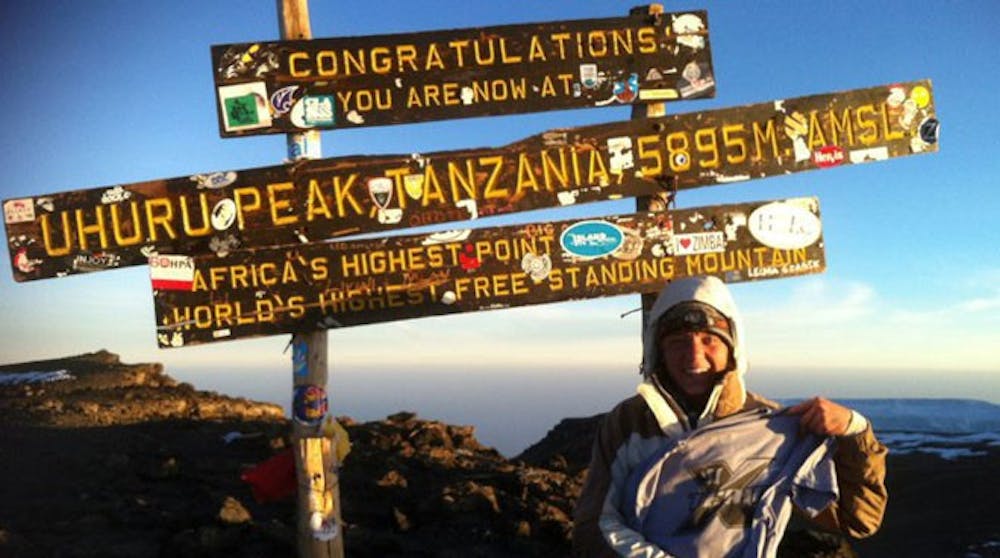Allie Ware has climbed Mt. Kilimanjaro and endured African summer heat, but these weren't her most influential memories of her trip to Tanzania. Instead, this sophomore lacrosse player recalls small children surrounding her at the foot of the mountain, begging her for water with its Swahili translation: maji. Ware is now promoting the company she helped found this year with that name, and a mission to bring water to Africans who need it.
The first night she was back home, Ware said she cried. "Why do I get to live this life? Why do I get to have a house? Why do I get to have healthcare? Why do I get have running water?" Ware recalled thinking. She said she knew she wanted to stay involved, but was unsure then of how.
Maji Bottles' mission is raising money to donate wells to African villages. When its founder, Boston College student Max Ade, reached out to her early to help promote his company, Ware said she was attracted by her memories of the word "maji."
"Allie's first-hand experiences with the water crisis shines through in all of her work with Maji Bottles," Ade wrote in an email. "She has a burning passion to do good in the world. Selling water bottles is just a front for Allie's real mission: to give clean 'maji' to those kids in Tanzania."
Ware described the company as "like Toms, but with life's most basic need," as Maji Bottles donates the profits from its sales of stainless steel bottles to a charity that drills wells in Africa. Maji Bottles advertises on its website that for every 1,000 bottles it sells, $5,000 will be put towards "solving the world's water crisis."
"Every time someone takes a sip from their Maji Bottle, they will know that someone, somewhere, is doing the same because of them," Ware said.
Ware ended up in Tanzania last summer, spurred by "just this desire to go to Africa," on a trip with the non-denominational student ministry Young Life. To be able to go, she raised $5,000 through a combination of printing and selling t-shirts, and collecting donations through a website. Ware says that some people bought dozens of shirts, and gave her back all but one to take to Africa.
In the three weeks that she was in Tanzania, Ware said she only showered twice, and one of those times was with a bucket of water poured over her. She lived with a tribe of the Maasai people, and saw first-hand people who have nothing. Getting water is a daily struggle for these tribespeople, and often the only sources are stagnant and unclean streams, unless a tribe is lucky enough to have a donated well.
Ware spent the first week and a half of her stay in Tanzania getting to know the Maasai, and helping to finish and furbish a medical center at a central tribal area with simple necessities like windows and a broom. "It's one thing to give your money, but it's a whole another thing to go out and live life with these people," she said "Our job was just to help them out any way we could."
She met people who had never seen a white person before, and described their first awkward interactions as akin to a middle-school dance. However, she soon made a deep connection with these people who'd lived such different lives than her.
She said she was dizzy, nauseated and very tired when, at midnight, her group began to push towards the peak of Mt. Kilimanjaro. To counteract the effects of low air pressure, Ware had to sleep at nearly a 90 degree angle from the ground.
For the last week and a half, she'd been making steady progress up the 19,341 feet of Africa's tallest mountain. "For the first week and a half, I got to see [the Maasai's] struggle, and for the second part, I got to kind of struggle myself," she said.
Enjoy what you're reading?
Signup for our newsletter
She recalled being able to see the curvature of the Earth from the summit, a view she said she hoped to never forget. Ware said she told people that if they have "the slightest desire to do anything like that, do it, because it will change your life."
Currently, Ware is selling Maji Bottles out of her room on campus, but she hopes to get other people involved. Too many people adopt an attitude of assuming that they don't have to donate because someone else will , Ware said.
Said Ware: "Someone has to step up, and bring awareness, and let people know that this is a serious issue."
Contact reporter Ben Panko at ben.panko@richmond.edu
Support independent student media
You can make a tax-deductible donation by clicking the button below, which takes you to our secure PayPal account. The page is set up to receive contributions in whatever amount you designate. We look forward to using the money we raise to further our mission of providing honest and accurate information to students, faculty, staff, alumni and others in the general public.
Donate Now



